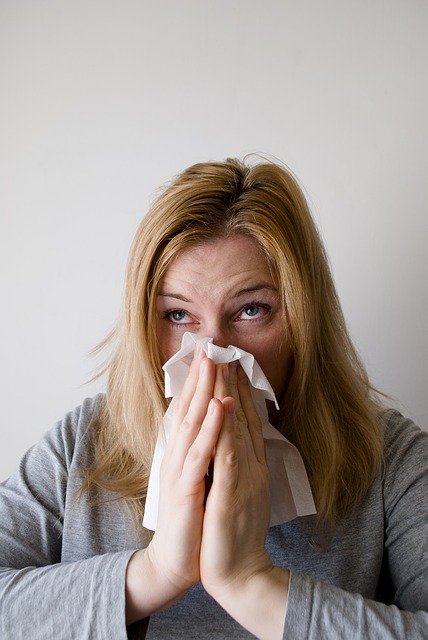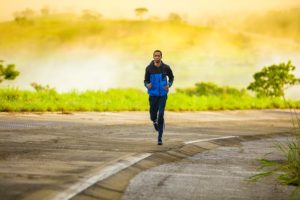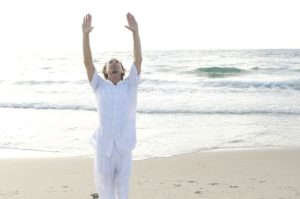
It’s a question I get asked frequently. Someone is starting to come down with a cold, or maybe they have a headache, should they still practice qigong?
As with many questions, there are multiple factors to consider, and awareness of your own body and energy is key to coming to the right answer for you in a given situation. In this article I will look at some of these factors, and make some analogies, to help you to be able to make good decisions about whether you should practice qigong in individual situations when you are sick.
Focus of the article
Our focus in this article will not be so much on when you have a long term or chronic illness. In these situations, practicing qigong can be very helpful for you to rebuild your vitality and strength and return to health. If the condition is serious you should seek the advice and guidance of an experienced qigong teacher or healer to help you to choose what to practice and how often to give you the best results, and follow that plan.
Our focus is going to be more on those passing and seasonal illnesses and disturbances. Coughs, colds, headaches, flus and the like. Things that come and go. Fortunately, if you practice qigong regularly, you tend to find that you become more resilient and suffer from these sorts of conditions far less often and far less severely. But… even the best of us can become run down at times, through stress, overwork, environmental factors and so on. It is important that we do our best to take care of ourselves, but even then there may be times that we find ourselves dealing with one of these minor illnesses.
So why would we want to practice qigong when we are sick?
Many qigong practices encourage us to breathe deeper, stimulate circulation and get the blood flowing more freely, relieve tension in the muscles, reduce unnecessary mental activity and stress, calm nerves, and in sometimes very direct ways direct energy to organs or other parts of the body that need it, and stimulate other body functions such as release of beneficial hormones and so on. All of these things can help to boost the immune system to fight infection, clear stagnant energy that may be causing pain, and start the body on its path to recovery and vitality.
In short, qigong is fantastic to help you recover from illness! But…
In all things wisdom and moderation is required. Even the best of things need to be applied at the right time, in the right way, and in the right amounts. Qigong is no different.
It may help to remember that even though in qigong we are working with energy, the work, and therefore the effort is still real. When we are sick, we need to consider carefully the relationship between the amount of effort practice will take, our bodies current ability to perform that effort, and the benefits we will receive.
A comparison to other types of exercise
I will start with an analogy that many of you may have experienced and may relate to. If you have ever had a regular aerobic exercise habit, maybe running, cycling, rowing, or similar, you may have noticed that sometimes doing this exercise when you were sick made you feel better and recover faster, and other times it may have made it worse.

These aerobic exercises do a number of things that can help your body to fight an infection. They encourage deeper breathing, increase blood flow, encourage healthy hormone production and release, and may under the right conditions boost the activity of the immune system. But – they do take a lot of energy to do this.
So… if an infection is just starting, and you then engage in vigorous aerobic exercise, the bodies energy reserves have not been depleted yet. It has the energy it needs to be stimulated and activated in this way, and if the boost in immune system activity is enough to clear out the infection, you will feel much better afterwards. The stimulation helped you to fight off the illness, and your body can now rest and recover from the exercise as usual.
On the other hand, if the infection has started to take hold, and progressed to the extent that the function of some of your bodies systems is now compromised, and your energy reserves have begun to be depleted, you may find that when you exercise vigorously your energy reserves are exhausted quickly. The stimulation to your immune system is not sufficient to fight off the illness, and after you exercise you are now not only tired from the exercise, but the infection is still there and your body is now drained of the energy it needs to hold it at bay. Often the illness will become worse rather than better, and it will take longer rather than less time to recover.
A similar thing can happen towards the other end of an illness. You body has already been busy fighting the infection, and may have it largely under control, but there is all sorts of stagnant energy left behind. Muscles tension, areas where the blood has pooled, metabolic wastes stored in the tissues, which may be causing aches, pains, general lethargy, and overall slowing down your recovery. In this situation some gentle aerobic exercise can be great to get the energy moving and allow fresh energy to flow and assist you in recovering more quickly. On the other hand, if you overdo it at this stage of recovery, again you may find that you deplete your energy reserves too much, and you go backwards instead of forwards.
Applying this idea to qigong
Of course qigong has a number of benefits above regular aerobic exercise when it comes to fighting off or recovering from illness. We can do exercises that specifically send the energy to the places that we need it to help us to build our strength and deal with any sickness. Also, there are many qigong exercises that are significantly less strenuous than the common aerobic exercises, so we are able to do these in a broader range of situations and conditions without depleting our energy reserves too much. But still we need to be aware and mindful of the relationship between our level of exertion, our bodies current energy reserves, and the benefit we will get from our practice.

In most situations, some gentle qigong practice is going to be helpful in either fighting off the illness or in speeding up recovery. But there will be some situations in which the balance goes the other way, and even the exertion of qigong is too much. In these situations it is best for you to simply rest. Sometimes the best qigong, and the best tool for recovery, is simply to sleep!
Some guidelines and recommendations for qigong when you are sick
To apply this understanding requires that you pay attention to and tune into both the needs and also resources that your body has in a particular moment. A few pointers that may be helpful for this:
- Before you practice – take a moment to really tune into and feel your body. See if it feels like it is up to the effort of practice. You can even ask in your own mind “is this practice going to make me feel better, or worse?” and then listen to the answer. Your body usually knows itself pretty well, and can give you quite accurate answers.
- Remember that different qigong exercises are more or less vigorous. They can be as simple as regulating and making your breathing smooth, or using your intention to guide energy through your body. Or they can range in physical exertion as you start to move your body from the very gentle to very strenuous. Choose something that feels right for your current condition, even if it is super super simple.
- If you think maybe some qigong would be helpful, but are unsure, start gentle and see how you feel. You could begin with something really really simple like the Five Waves Practice from Long White Cloud Qigong, and then see how you feel afterwards. If you feel good, you might just want to leave it there, or you might consider trying another slightly more vigorous practice.
- Check in on yourself regularly as you practice. A little practice might be good, but a lot might be too much. Take a moment to check how you feel from time to time, when you start to feel fatigued it may be time to bring your practice session to a close.
- If you need to rest, give yourself permission to just rest. Don’t let any thoughts or feelings of guilt enter into you – because your really should be doing something. Sometimes resting is doing something ????
- In some circumstances you may find it useful to seek out the help of a qigong healer. When you are too run down to stimulate and circulate your energy, someone skilled in qigong can help to do it for you. This can be an option to get the benefits of qigong energy movement, without the strain on your already low energy reserves. It can help to build you up and recover more quickly. The Long White Cloud Qigong course Introduction to Qigong Healing is coming soon and will teach you techniques and skills to help yourself and others in this way. Make sure you are signed up to our newsletter to find out when it becomes available!
I hope this article has given you a good framework to understand when it may or may not be good for you to practice qigong when you are sick. In most cases qigong practice is great for building our health and vitality, but as with all things, awareness, wisdom, and judgement is always required for best results.
Yours in qi!
John Munro
Long White Cloud Qigong
4 Comments. Leave new
Great post! Another thing to consider is if you are doing Qigong in a group in a small room, you may not want to spread your illness to others as they will be breathing your germs.
Yes of course, I was thinking more along the lines of practicing by yourself, but that is definitely an important factor to consider.
I recently had covid and I practiced qigong everyday but instinctively did as is mentioned and did what my body was telling me to do. I found that my between heaven and earth practice especially built my energy reserves so I’d do it on waking and when I started to feel fatigued. I only had a few hours of severe symptoms on the onset and just a few days heavy fatigue. I am convinced that daily qigong prevented taking to my bed. There were definitely key times of the day that were more effective in helping me get through.
I have no doubt that Qigong helped my recovery from Covid. I was so unwell but still managed to do some lung moves every day. Ongoing Qigong is helping me recover quicker and I am needing less and less sleep in the day. Thank you John for your advice around this.